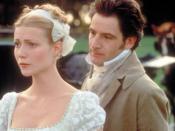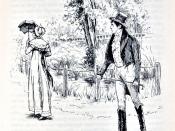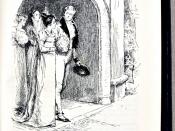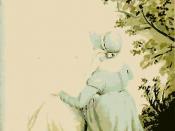Emma rightly argues that Mr. Knightley has a vastly superior character to that of Frank Churchill. Though Mr. Knightley does seem to exert his power to mold Emma into what he thinks she act like, Frank Churchill deliberately deceives Emma to protect himself. When it comes to character, deception of others around you to protect yourself seems to diminish any inclinations towards good character. It also makes one think about the moral standards that one is living under. Frank and Mr. Knightley seem to have their own interests in mind, along with Emma, however, Mr. Knightley's interests are for the betterment of Emma.
It is obvious that Mr. Knightley detests Frank Churchill from the very beginning. Mr. Knightley seems to feel that Churchill is being selfish and should not be deterred by his aunt if he needs to be dutiful by visiting his father. "It is not to be conceived that a man of three or four-and-twenty should not have the liberty of the mind"æThere is one thing, Emma, which a man can always do, if he chuses, and that is, his duty; not by maneuvering and finessing, but by vigour and resolution.
It is Frank Churchill's duty to pay attention to his father. He knows it to be so, by his promises and messages; but if he wished to do it, it might be done."ÃÂ (Austen, 95).
Emma and Mr. Knightley go on to argue about Churchill and discuss how Emma thinks his arrival will be one that will be exciting for everyone, as "he will be a treasure at Highbury"ÃÂ (97). Quite the reversal, Knightley tells Emma that she must "excuse [his] being so much overpowered. If I find him versible, I shall be glad of his acquaintance; but if he is only a chattering coxcomb, he will not occupy much of my time or thoughts"ÃÂ (98).
After Churchill finally arrives, Emma is quite ready to finally meet him, and seems to have already formed quite an opinion as she tells Mr. Knightley that she already has a favorable prejudice towards Churchill. "But I am very much [prejudiced], and without being at all ashamed of it. My love for Mr. and Mrs. Weston gives me a decided prejudice in his favor"ÃÂ (98).
With the arrival and meeting of Emma and Churchill, they quickly become friends. Churchill is also acquainted with Jane Fairfax, a woman of Emma's age, but much lower social class, while Churchill is more comparable to Emma's social class. It cannot go without saying that Emma presumably has realized that she and Churchill are a good match socially, as they are in the same age grouping and social ranks. What Emma does not know, along with everyone else, is that Churchill and Fairfax are secretly engaged.
Churchill exudes cruelty in his character when he seemingly gossips about Jane to Emma in a callous manor. One instance Churchill describes Jane to Emma as "Ill, very ill-that is, if a young lady can ever be allowed to look ill. But the expression is hardly admissible"æLadies can never look ill. And, seriously, Miss Fairfax is naturally so pale, as almost always to give the appearance of ill health.-A most deplorable want of complexion"à(129). However, it is known later on that Churchill was merely trying to make sure that no one would ever think the two were linked romantically. His tactics, however, went to the other extreme and ended up hurting Jane in the long run.
Indirectly, Churchill performs an unkind act towards Emma. His manipulation of her emotions through flattery and other devices is deceptive and is in bad character. Not only is he deceptive towards Emma, he deceives everyone in town by down playing any visits to Jane. When he first arrives, he asks of Jane and mentions he would like to visit, but then adds, "There is no necessity for my calling this morning"æanother day would do as well; but there was that degree of acquaintance at Weymouth which"ÃÂ- to which his father replied, "Oh! Go to-day, go to-day. Do not defer it. What is right to be done cannot be done too soon"ÃÂ. Churchill now appears to be a moral character in a Kantian view due to the fact that he is now doing something which he would rather not so soon. Seeing as how Kant would say that a moral act is one you wish not to do, it can be seen by others around Churchill that he does not want to go necessarily at that point in time.
The piano which is secretly given to Jane from Churchill also presents a deed of deception on Churchill's part. Not only does he lie by omission to everyone, but he also supports the spread of gossip dealing with Jane and Mr. Dixon, whom she was thought to have had an affair with. Mr. Dixon was a married man. The inference from Churchill, that the piano may have been sent by Mr. Dixon, to Emma just makes things less favorable for Jane.
"Mr. Knightley, who, for some reason best known to himself, had certainly taken an early dislike to Frank Churchill, was only growing to dislike him more. He began to suspect him of some double dealing in his pursuit of Emma. That Emma was his object appeared indisputable. Everything declared it, his own attentions, his fathers hints, his mother-in-law's guarded silence; it was all in unison; words, conduct, discretion and indiscretion, told the same story"æMr. Knightley began to suspect him of some inclination to trifle with Jane Fairfax"à(224).
Now, Mr. Knightley displayed his good characteristics throughout the story. One example of his high character is when they are at the ball. Harriet has no one to dance with, and Mr. Elton is asked to dance with her, but he replies harshly and walks away. After seeing this, Mr. Knightley takes it upon himself to do the right thing and asks Harriet to dance. Emma sees this and is seemingly impressed by his kindness towards Harriet, even after he has told Emma over and over again that Harriet is not of their social ranks.
Knightley shows other superiority in his character just by being a friend to Emma, especially when she fancies other men, namely Frank Churchill. Mr. Knightley, though opinionated about Churchill's character, still remains good friends with Emma and listens to her and tries to give her a better perspective of the big picture. Even when Mr. Knightley believes that Emma's affections for Churchill were stronger than friendship, he comes to console her, knowing that he is in love with her himself.
Sticking by Emma, Knightley is performing a moral act in Kantian view, as he may not want to hear about Churchill, but he does listen, and then replies.
To look at the other side, Churchill's letter to Mrs. Weston was able to redeem some of his character, as in a Kantian view, by deceiving everyone and hurting Jane in the interim, Churchill was performing acts which he did not want to do, but needed to. This can be seen as a moral act since he did not want to hurt others. He talks about his actions towards Emma, "I cannot deny that Miss [Emma] Woodhouse was my ostensible object-but I am sure you will believe the declaration, that had I not been convinced of her indifference, I would not have been induced by any selfish views to go on.-Amiable and delightful as Miss Woodhouse is, she never gave me the idea of a young woman likely to be attached, and that she was perfectly free from any tendency to being attached to me, was much my conviction as my wish"ÃÂ (287-88).
To be fair, Mr. Knightley's superior character can also be interpreted as something that is only in his best interest towards Emma. Mr. Knightley presumably waits for Emma to mature before proposing. His character may only appear superior as he is trying to further Emma along in her maturity development on the path to his proposal of marriage.
However, it seems clear that Churchill's actions towards everyone, specifically Emma and Jane were not of a good character, as he deceives and causes pain to both women. Mr. Knightley, though sometimes harsh towards Emma, is looking out for her best interest as she matures. Mr. Knightley's superior character to that of Frank Churchill can also be surmised as a wisdom which has been gained by age and maturity that Churchill has yet to experience. In the end, both characters are ostensibly good, moral characters, and Emma was correct in her assertion.





